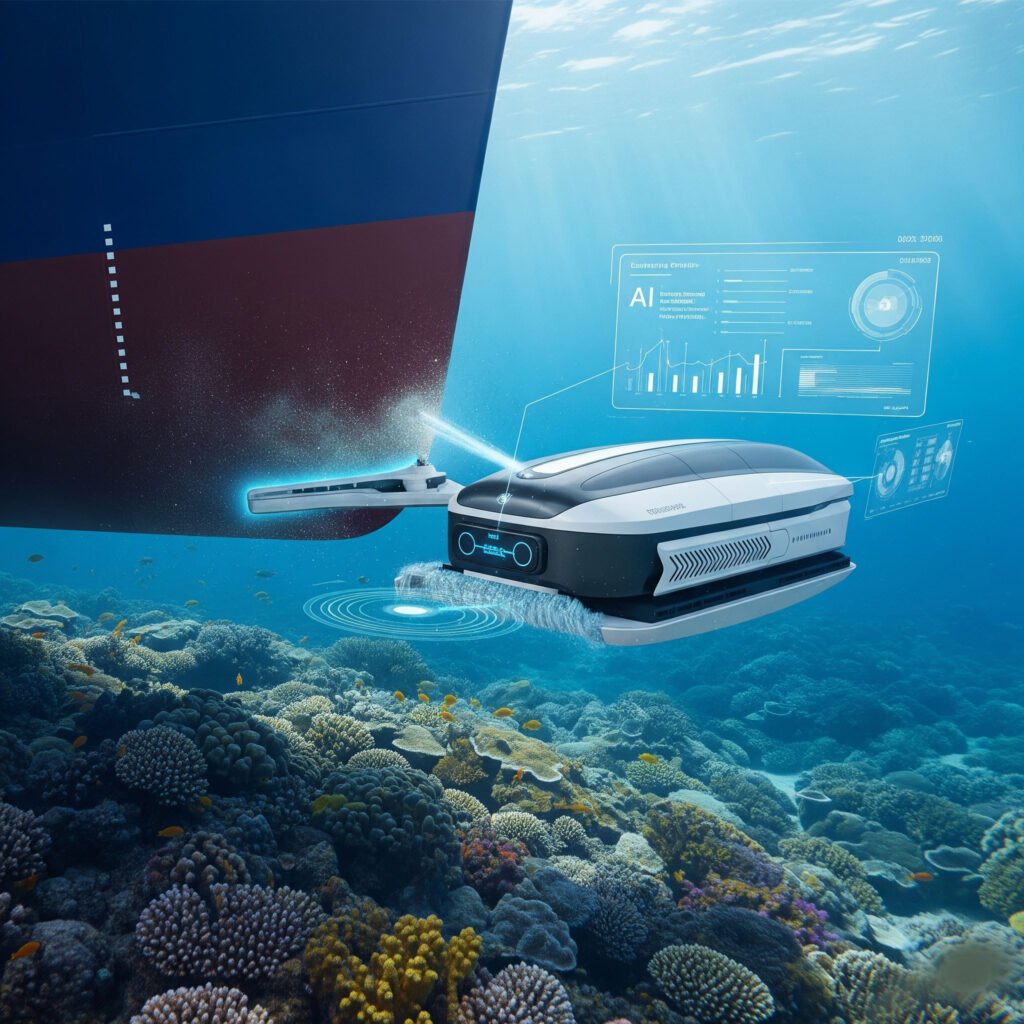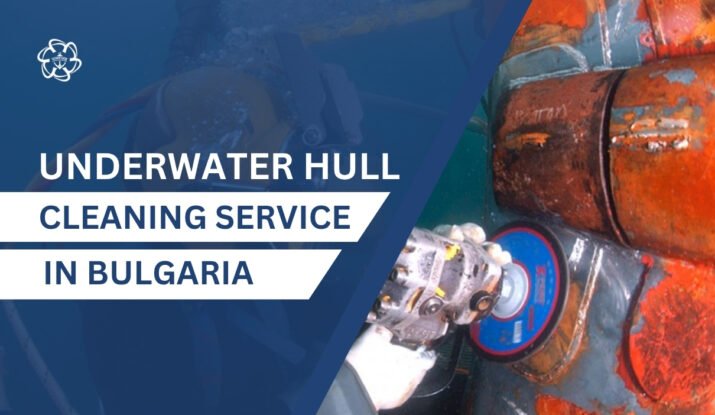Underwater hull cleaning in Bulgaria: In the competitive maritime environment of Bulgaria’s Black Sea ports, maintaining your vessel’s efficiency is critical. One of the most overlooked yet impactful maintenance tasks is underwater hull cleaning. Over time, marine growth such as algae, barnacles, and biofilms accumulates on the submerged parts of ships, negatively affecting speed, fuel consumption, and operational costs. In this detailed guide, we explore the importance of underwater hull cleaning in Bulgaria, modern cleaning technologies, and how professional services can help you optimize vessel performance while cutting costs.
Understanding Biofouling and Its Impact on Vessels
Biofouling is the unwanted accumulation of microorganisms, plants, algae, and animals on wetted surfaces of ships. In Bulgaria’s temperate Black Sea waters, biofouling can develop rapidly, especially in port areas and sheltered waters. This growth creates surface roughness and drag that leads to:
- Reduced Speed: A fouled hull can reduce a ship’s speed by up to 10-15%, requiring more engine power to maintain schedules.
- Increased Fuel Consumption: The added resistance forces engines to burn more fuel, raising operational costs significantly.
- Higher Emissions: More fuel burned means higher CO₂ and pollutant emissions, affecting environmental compliance.
- Hull and Propeller Damage: Organisms can cause corrosion and damage to anti-fouling coatings, leading to expensive repairs and shortening the vessel’s lifespan.
Why Underwater Hull Cleaning Is Crucial in Bulgaria
Bulgaria’s maritime industry relies heavily on efficient vessel operations for cargo, passenger, and fishing fleets. The region’s ports like Varna and Burgas serve as strategic transit points, making vessel turnaround time and fuel economy critical.
Underwater hull cleaning offers a proactive solution:
- Operational Continuity: Unlike dry-docking, underwater hull cleaning is performed while the ship remains afloat, preventing costly downtime.
- Cost Efficiency: Regular cleaning reduces fuel consumption by restoring the smoothness of hull surfaces, saving thousands of dollars annually.
- Regulatory Compliance: With international conventions such as the IMO’s Biofouling Management Guidelines, Bulgarian operators must prevent the spread of invasive species through proper hull maintenance.
Advanced Underwater Hull Cleaning Techniques Used in Bulgaria
Modern underwater hull cleaning in Bulgaria, including those modeled after best practices from cleanship.co, combine technology and skilled diving expertise to provide effective, safe, and environmentally responsible cleaning:
1. Diver-Based Cleaning with Specialized Tools
Experienced divers manually clean the hull using non-abrasive brushes and scrapers designed to avoid damaging anti-fouling coatings. Divers can inspect critical areas such as sea chests, thrusters, and propellers during the cleaning process.
2. Hydraulic and Electric Rotating Brushes
These mechanized brushes enable faster removal of heavy fouling on large hull surfaces. Operators carefully control brush speed and pressure to protect coatings while ensuring thorough cleaning.

3. Low-Pressure Water Jetting
Water jets at controlled pressures dislodge stubborn biofouling without harming the hull. This technique is especially effective on areas with layered or hardened growth.
4. Robotic and Magnetically Attached Cleaners
Emerging technologies include robotic hull cleaners that autonomously move over the vessel’s surface, providing consistent cleaning while reducing the need for divers in hazardous conditions. Magnetically attached devices adhere to the hull and operate remotely, ensuring precision.
Environmental and Safety Considerations
Professional underwater hull cleaning services in Bulgaria strictly follow environmental protocols:
- Containment and Waste Collection: Removed biofouling material is captured to prevent contamination of local waters and the spread of invasive species.
- Compliance with IMO Guidelines: Hull cleaning activities are aligned with IMO’s Biofouling Management Guidelines and local maritime environmental regulations.
- Safety Standards: Divers and technicians adhere to rigorous safety practices, including using decompression procedures, proper equipment, and trained personnel to minimize risks.
Economic Advantages of Underwater Hull Cleaning
By investing in routine underwater hull cleaning, ship operators in Bulgaria can realize:
- Fuel Savings: Restoring the hull’s hydrodynamic profile can reduce fuel consumption by up to 15%, which adds up to substantial savings on long voyages.
- Increased Speed and Schedule Reliability: Maintaining optimal speed ensures better adherence to shipping schedules and reduces delays.
- Extended Maintenance Intervals: Preventing corrosion and coating damage reduces the frequency and cost of dry-dock repairs.
- Long-Term Asset Protection: Proper hull maintenance prolongs the lifespan of hull coatings and propellers, safeguarding vessel value.
Choosing the Right Underwater Hull Cleaning Provider in Bulgaria
When selecting a underwater hull cleaning in Bulgaria, consider these factors:
- Experience and Credentials: Look for providers with a proven track record in underwater cleaning and diving operations.
- Environmental Responsibility: Ensure they follow sustainable practices for waste disposal and invasive species management.
- Technology and Equipment: Access to modern cleaning tools and robotic solutions enhances efficiency and safety.
- Availability and Flexibility: Timely service that fits your vessel’s schedule minimizes disruption.
- Transparent Pricing: Understand all costs upfront to evaluate the true value of the service.
Conclusion
Underwater hull cleaning in Bulgaria is a vital maintenance practice for vessels operating in Bulgaria’s Black Sea waters. By removing biofouling regularly, shipowners and operators can boost vessel speed, reduce fuel consumption, lower emissions, and extend the lifespan of underwater components. Modern, professional hull cleaning services ensure efficient, safe, and environmentally compliant solutions, helping you cut costs while maximizing operational performance.
For expert underwater hull cleaning in Bulgaria, consider trusted providers like CleanShip.co, who combine advanced technology, skilled diving teams, and a commitment to sustainable marine practices.
FAQs:
Q1: What is underwater hull cleaning?
Underwater hull cleaning is the process of removing marine growth, such as algae, barnacles, and biofilms, from the submerged surfaces of a vessel while it remains afloat, improving performance and fuel efficiency.
Q2: Why is underwater hull cleaning important for vessels operating in Bulgaria?
Bulgaria’s Black Sea environment encourages rapid biofouling growth, which increases drag and fuel consumption. Regular cleaning ensures vessels maintain optimal speed, reduce operating costs, and comply with environmental regulations.
Q3: How often should underwater hull cleaning be performed?
Cleaning frequency depends on vessel type, operating conditions, and hull coating, but typically ranges from every 3 to 6 months to prevent heavy fouling.
Q4: Is underwater hull cleaning in Bulgaria safe for the ship’s protective coatings?
Yes, when done by trained professionals using the right tools and techniques, underwater cleaning protects anti-fouling coatings and avoids damage.
Q5: Does underwater hull cleaning in Bulgaria comply with environmental regulations?
Professional services follow IMO guidelines and local Bulgarian regulations by collecting removed biofouling and preventing the spread of invasive species.


